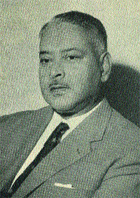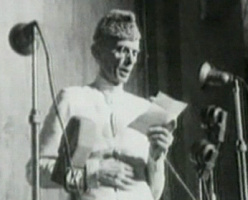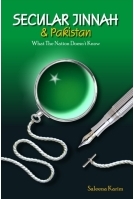
Chief Justice Cornelius. Public domain image.
[I] am slowly beginning to understand what is built into the Constitution of Pakistan, in the way of political obligation … I have learnt that a non-Muslim can only be a full citizen of Pakistan if, on the secular side, he conforms to the requirements of the Objectives Resolution, read with the first 8 Articles, that is Parts I (the Republic of Pakistan) and II (Fundamental Rights and Principles of Policy). So far as I can see, at present, this is entirely possible, and would be easy, if there were some formulation of the basic principles contained in the Scriptures of Islam, in regard to equality, tolerance, social justice etc.
These are the words of Alvin Robert Cornelius (1903-1991), one-time Chief Justice of Pakistan, in a personal letter dated July 1965. A practising Christian, he was one of the many people who supported the Pakistan idea. He was also amongst the few who understood the content of the Objectives Resolution as a statement of universal human ideals and one that made great promises to all its citizens regardless of caste and creed. But, he said, these ideals hadn’t been spelled out.
AN OVERLOOKED ISSUE
And Cornelius wasn’t the only person to say this. Two other Pakistanis (Mian Iftikharuddin and PD Bhandara, father of MP Bhandara) also made similar remarks in criticism of Pakistan’s constitution-making body during Pakistan’s fledgling years. All three of these individuals stated in no uncertain terms that some fundamental principles had not been accounted for. Iftikharuddin complained in 1949 that the Objectives Resolution didn’t …
… incorporate those principles which will make real democracy possible …
– and PD Bhandara said in 1954:
The very essence of an Islamic Constitution which is brevity and simplicity is conspicuous by its absence. … In the process of evolution gained by experience, I trust our Constitution will be remodelled to conform more to the tenets of Islam …
But their words went unheeded, and with time the Objectives Resolution became an issue of enormous contention.

MA Jinnah on 14 August 1947, and not 11 August as shown on Wikipedia. Image from my personal collection.
Critics of the Objectives Resolution see it as some sort of backdoor to theocracy, even though a religious state was the last thing on the minds of those who penned it. MP Bhandara’s 11 August 1947 bill (introduced in 2006) was an attempt to insert one of Jinnah’s most famous speeches on civil equality alongside the Objectives Resolution in the constitution. Bhandara said the speech would act as an ‘ideological balance’. Ironically, unlike his father, MP Bhandara had actually misinterpreted the Objectives Resolution and his bill (his version of it, anyway) was only going to make things worse by causing a conflict. I tried to tell him this, but I don’t think he heard me.
THREE WORDS
All this made me think of the theorem. By now I saw the connection to the three words in Iqbal’s Reconstruction – the three basic ideals of equality (justice), solidarity (unity), and freedom (liberty). That passage of Iqbal became my muse. Even Jinnah had been subconsciously drawn to these three ideals, which was why he quoted the French equivalent liberté, égalité, fraternité (liberty, equality, fraternity) several times during those last few months of his life as Pakistan’s first Governor General.
By 2009, a publisher in the UK and another in Pakistan had both already offered me a contract for SJ1’s revised edition. They expected me to get it to them in a few weeks. It took me 14 months, and thankfully both publishers were very patient with me. By the time it was finished, SJ2 was a brand new book containing new and original research, and only parts of it coincided with SJ1.
LEFT UNSAID
 In SJ2, I briefly mentioned this ‘missing’ element of Pakistan’s constitution, and even said that my old appendix (imported from SJ1 and improved in SJ2) contained the very same ‘core principles’ of the Quran that could help complete the constitutional work begun back in 1949. What I didn’t mention – though I discussed it with one or two people including a prominent Pakistani retired senior judge – was that I also had an idea for a bill that could introduce the same ideals as those listed in my old appendix, the source of the theorem. To my mind the introduction of binding, interconnected values would not only strengthen and clarify the promises made in the Objectives Resolution, but would also put an end to the misinterpretation of what it contains.
In SJ2, I briefly mentioned this ‘missing’ element of Pakistan’s constitution, and even said that my old appendix (imported from SJ1 and improved in SJ2) contained the very same ‘core principles’ of the Quran that could help complete the constitutional work begun back in 1949. What I didn’t mention – though I discussed it with one or two people including a prominent Pakistani retired senior judge – was that I also had an idea for a bill that could introduce the same ideals as those listed in my old appendix, the source of the theorem. To my mind the introduction of binding, interconnected values would not only strengthen and clarify the promises made in the Objectives Resolution, but would also put an end to the misinterpretation of what it contains.
And what happened after that? Well, the idea remains an idea. In the end, I made it – the theorem, that is – ‘real’ only in my fictional universe. But there it makes for useful commentary on the human condition … and it’s my way of paying homage to the Pakistan idea.
This is the final part. Earlier posts in this mini-series:
Introduction … Pt 1: The first book …
Pt 2: Libredux … Pt 3: The missing principle
(Some images in this post are copyrighted)

 Today I’m being interviewed at the popular reviews site Mother/Gamer/Writer. As well as explaining exactly what Peter Manner (aka the Peace Man) from Systems has in common with Scorpion from the video game series Mortal Kombat, I have also mentioned my search for any metal music bands to help me with recording a song that appears in the novel …
Today I’m being interviewed at the popular reviews site Mother/Gamer/Writer. As well as explaining exactly what Peter Manner (aka the Peace Man) from Systems has in common with Scorpion from the video game series Mortal Kombat, I have also mentioned my search for any metal music bands to help me with recording a song that appears in the novel …









